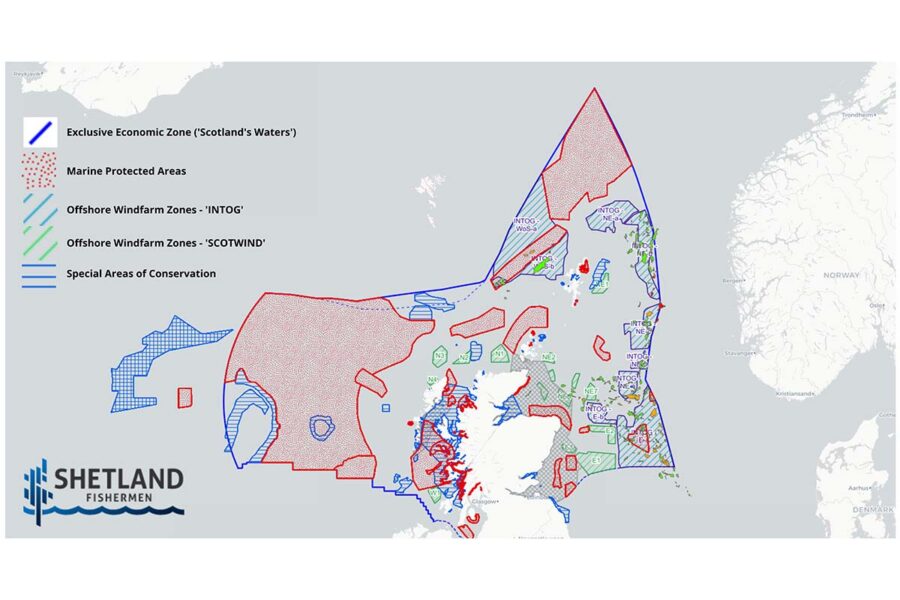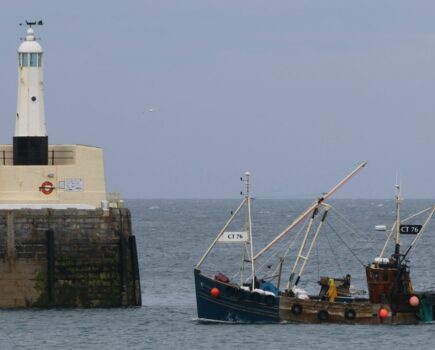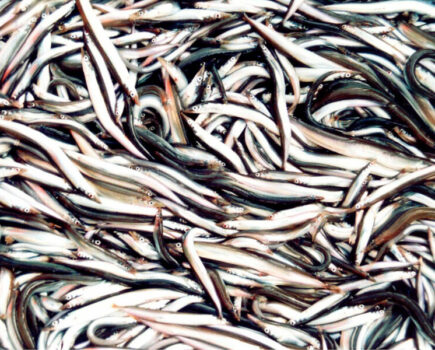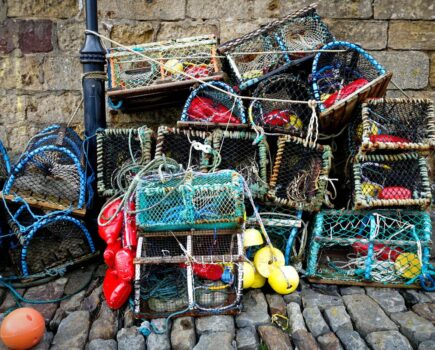The Shetland Fishermen’s Association (SFA) has published a map (pictured above) highlighting the extent to which Shetland fishermen are being crowded out of their traditional grounds by a combination of renewable energy developments and ‘excessive’ conservation measures.
Huge areas of Scottish waters could be closed off to fishing, or subjected to severe fishing restrictions, under Scottish government plans, the association warns, putting fishermen’s livelihoods at risk.
SFA executive officer Daniel Lawson said: “Fishing crews, so vital to Shetland’s economy, are being displaced from grounds where fishing has been going on for hundreds of years as part of a so-called ‘Just Transition’ that is anything but just.
“Sadly, a climate-smart industry that has among the lowest carbon footprints and lowest food miles of any food producer is in danger of being sacrificed for no good reason.
“Ministers urgently need to take stock of the situation and ensure that there is enough space for the fishing industry to continue to succeed, and to support our community’s future.”
The SFA map highlights the extent of the closed and/or restricted areas in what are Europe’s richest fishing grounds.
Daniel Lawson pointed out that the map does not show other restrictions caused by developments such as aquaculture, subsea cables, oil and gas infrastructure, private offshore wind farm developments and tidal energy installations.
“There is so much now that fishermen are really feeling the squeeze,” he told Fishing News. “We’re just hoping ministers will see the map and think: ‘OK, fair enough – that’s quite a lot of ground that’s being lost.’
“It’s gone full steam ahead on MPAs, offshore wind and all the rest of the offshore developments. We don’t feel like anyone is saying: ‘Hang on a minute, what about the folk who already use the sea for a demonstrably good end?’
Scottish ministers are also proposing to compound the issue by enhancing the existing fishing restrictions across MPAs and Special Areas of Conservation, which will result in a further loss of grounds.
The Scottish 2022 Programme for Government commits to designating 10% of Scotland’s sea space as ‘highly protected’, on top of the existing MPA network, by 2026, and the Scottish government is encouraging offshore wind farm development by leasing seabed sites through its SCOTWIND and INTOG auctions.
Daniel Lawson said that by the time the extra 10% of sea space that will be taken up by highly protected marine areas are added in, ‘you’re running out of sea pretty quickly’. “They’re saying they ‘might’ let vessels steam through the highly protected areas – that’s the scale of restrictions we’re talking about. It’s pretty full-on.
“If you look at the space that’s left, and then you add in miles and miles of gill-nets around Shetland, you don’t have a hope of getting to the fish you need to catch.
“The other problem is that all the vast amount of fishing effort that goes on around Shetland is being pushed into whatever areas are left. I dread to think what that means – collisions, tensions rising over what grounds are left… it doesn’t paint a pretty picture for the future.”
The SFA points out that in its recently published Fisheries Management Strategy, the Scottish government claims to regard fishing as a ‘vital part of Scotland’s economy’, states an ambition to ‘secure the future of our fishing industry for generations’ and commits to building up a ‘world- class fishing nation’ in Scotland.
But through its actions on MPAs and ‘short-lived’ offshore renewable projects, ministers are inhibiting these aims, says the association.
Orkney and Shetland MP Alistair Carmichael told Fishing News: “Energy projects and local fisheries ought to be able to coexist successfully – there must be a level at which sustainable fishing practices can be maintained without simply barring fishermen from more and more of their historic grounds.
“I am concerned that we may be beginning to see the Scottish government turn away from the interests of fishing communities.
“There is an equitable solution to be found if ministers are willing to find it. It is blindingly obvious that it is in the interest of coastal communities to have sustainable fisheries into the future and the potential benefits of renewable generation.
“We should not have to choose – with the right consultation and buy-in from local communities we can have a win-win for all.”
Daniel Lawson said: “A well-managed and well-supported fishing industry could continue to provide for generations to come.
“Coastal communities currently reap the benefits of the seafood brought back by our sustainable, modern family-owned fishing fleet. Profits from offshore wind farms will disappear into the budgets of private, wealthy, multinational energy firms.
“They speak about a just transition, but if it does everything but protect fishing grounds then it’s not just. It’s going at such a pace now that it can’t even be described as a transition.
“Fishermen accept we’re going to get offshore wind farms, but we should at least try and have them where there’s not sustained fishing effort.
“There is space for fishing, marine protection measures and offshore wind to all enjoy mutual futures. Our members accept and understand the way the world is going, but so far this ‘Just Transition’ is taking away vast fishing grounds – and giving nothing in return.
“That isn’t just, and it isn’t a transition.”
This story was taken from the latest issue of Fishing News. For more up-to-date and in-depth reports on the UK and Irish commercial fishing sector, subscribe to Fishing News here or buy the latest single issue for just £3.30 here.








